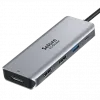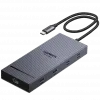Lightning is a proprietary computer bus and power connector created by Apple Inc. to replace its previous proprietary 30-pin dock connector, used to connect Apple mobile devices like iPhones, iPads and iPods to host computers, external monitors, cameras, USB battery chargers and other peripherals. Using eight pins instead of thirty, Lightning is significantly more compact than the 30-pin dock connector and can be inserted with either side facing up. However, it is incompatible with cables and peripherals designed for its predecessor, unless used with an adapter. It was introduced in 2012, and is used by the iPhone 5, iPhone 5S, iPhone 5C, 5th generation iPod Touch, 7th generation iPod Nano and the iPad Mini and 4th generation iPad.
The Lightning connector was introduced on September 12, 2012. The connector was introduced as a replacement for the 30-pin dock connector for all new hardware that was announced at the same event. Devices that were initially compatible with the connector were the iPhone 5, iPod Touch (5th generation), and the iPod Nano (7th generation). The iPad (4th generation) and the iPad Mini were added as Lightning devices in October 2012.
Technology
Lightning is an eight-pin connector which carries a digital signal. It is non-directional and can be inserted into the device with either side facing up or down. Apple offers various adapters between the Lightning and other interfaces such as Lightning to Apple proprietary 30 pin, Lightning to universal serial bus (USB) as well as accessories to interface with high-definition televisions, VGA monitors, Secure Digital (SD) cards and SD card reader. The Lightning to 30-pin adapter supports only a limited subset of the available 30 pin signals: USB data, USB charging, and analog audio output.
Inserting the plug in one orientation is not electrically equivalent to inserting it the other way around (it is not palindromic). The plug itself incorporates a processor which detects the plug's orientation and routes the electrical signals to the correct pins. Official Lightning connectors contain an authentication chip that makes it difficult for third-party manufacturers to produce compatible accessories without being approved by Apple Nevertheless, Chinese company iPhone5mod began selling an iPhone 5 dock charging station in October 2012 and claimed that it could "bypass Apple's authentication functions" using "cracked chips". iOS 7 enforces a block on any Lightning plug that is not authorized by Apple.
In December 2012, Belkin became the first 3rd-party company to start selling lightning accessories (their line started with a car charger and dock).



